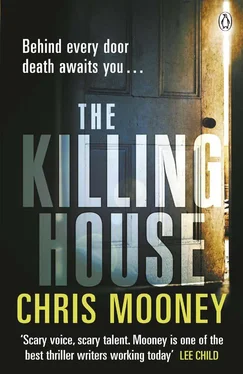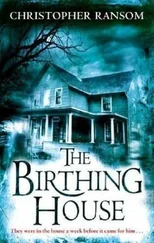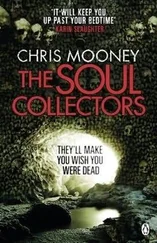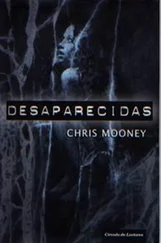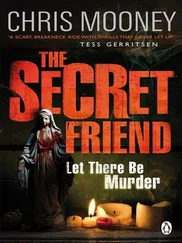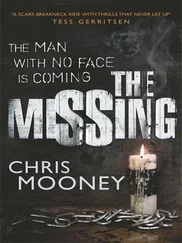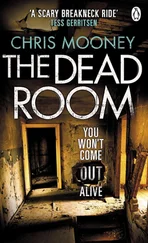Chris Mooney - The Killing House
Здесь есть возможность читать онлайн «Chris Mooney - The Killing House» весь текст электронной книги совершенно бесплатно (целиком полную версию без сокращений). В некоторых случаях можно слушать аудио, скачать через торрент в формате fb2 и присутствует краткое содержание. Жанр: Триллер, на английском языке. Описание произведения, (предисловие) а так же отзывы посетителей доступны на портале библиотеки ЛибКат.
- Название:The Killing House
- Автор:
- Жанр:
- Год:неизвестен
- ISBN:нет данных
- Рейтинг книги:5 / 5. Голосов: 1
-
Избранное:Добавить в избранное
- Отзывы:
-
Ваша оценка:
- 100
- 1
- 2
- 3
- 4
- 5
The Killing House: краткое содержание, описание и аннотация
Предлагаем к чтению аннотацию, описание, краткое содержание или предисловие (зависит от того, что написал сам автор книги «The Killing House»). Если вы не нашли необходимую информацию о книге — напишите в комментариях, мы постараемся отыскать её.
The Killing House — читать онлайн бесплатно полную книгу (весь текст) целиком
Ниже представлен текст книги, разбитый по страницам. Система сохранения места последней прочитанной страницы, позволяет с удобством читать онлайн бесплатно книгу «The Killing House», без необходимости каждый раз заново искать на чём Вы остановились. Поставьте закладку, и сможете в любой момент перейти на страницу, на которой закончили чтение.
Интервал:
Закладка:
‘What can you tell me about Barry Herrera? I assume you conducted a background check.’
‘I always perform a thorough search on anyone looking to hire me.’
‘And?’
‘He’s as clean as a whistle,’ Karim said. ‘The man was born and raised in Montpelier, Vermont, the only child of Marcus and Samantha Herrera. They both died of cancer — the father in 1978, the mother in 1984. Barry attended the local high school, where he excelled in academics and tennis. Brown offered him a scholarship. He graduated summa cum lade and moved on to the BU School of Medicine, where he picked psychiatry as his field of study. From there he, like many doctors, bounced around various public and private hospitals, working mainly with troubled children. In 1989 he met Theresa Henderson, an office assistant at a privately owned clinic in Raleigh, South Carolina. They married in 1993 and moved to Applewood, Colorado, in 1998, when he accepted a job.’
‘And the wife?’
‘Unremarkable. Born Theresa King in Danbury, Connecticut. Went to the public school and local college. Moved with a college friend to South Carolina, met Barry Herrera, married.’
‘How deep did you dig?’
‘As deep as I could,’ Karim said. ‘A routine background check provides a snapshot — a starting point. The real treasures, as you well know, are locked behind secured databases scattered all across the Internet. I assigned someone else to do the actual data mining. This person is as good with computers as you are.’ Then, with a sly grin, Karim added, ‘Maybe even better.’
‘Anything jump out?’
‘No. Nothing.’
‘Financials?’
‘Barry made a good living, so the wife stayed at home. They had a reasonable mortgage, which they paid on time every month, along with their credit card and car loans. They invested in their retirement accounts and saved a tidy sum for an emergency. No suspicious payments or withdrawals. They were a boring, upper-middle-class couple living the American dream.’
‘Until someone abducted their son.’
‘Yes,’ Karim said sombrely. ‘Until that.’
‘Did you meet him?’
‘No. I was scheduled to meet him and his wife yesterday at their home. I never spoke to the man on the phone, only his wife. She was the one who initiated contact.’
‘Did he share his wife’s belief that her son was still alive?’
‘She never mentioned anything to the contrary.’
‘What did she say about her husband?’
‘Just that he was busy. That in the last two years he spent more time away from home, burying himself in his work as a child psychiatrist. What happened to their son put a strain on their marriage. These things often do.’
Karim, Fletcher knew, had first-hand experience with such matters.
For years Karim had maintained a rather bonhomie relationship with his ex-wife, Judith, often travelling to England to share holidays with her extended family, who still welcomed him into the fold. Their son had wanted to attend high school in the States, and at age fifteen moved across the pond to live with his father.
Jason Karim was seventeen years old when he was abducted on his way home from a private Manhattan school. Karim had endured five dreadful, nightmarish days before his son’s body turned up in an alley in the Bronx. Karim flew to London to deliver the news to his ex-wife.
Judith blamed him for their son’s murder. Jason should never have been allowed to navigate his way through such a dangerous city, especially at night. Karim acquiesced to his ex-wife’s wishes to have their son buried in London. But Judith had attended neither the wake nor the service; she’d suffered a breakdown and was now confined to a private hospital paid for by Karim.
Karim still made semi-annual pilgrimages to visit Judith, who had retreated to a cocoon of fantasy, telling doctors that her son was alive, travelling the globe as a hedge-fund manager. Despite medication and therapy, she still regularly picked up the phone, dialled an imaginary number and pretended to speak to her imaginary son, his imaginary wife and her two imaginary grandchildren — a boy named Bradley and a girl named Clare.
Karim had used his personal loss as a turning point. The ghost of Jason Karim was both the inspiration for, and a silent partner in, his father’s enterprise of helping fellow victims who called on him for assistance. Each case he solved, each missing child he recovered, provided not only a purpose to his life but also helped him to manage the considerable guilt he dragged like shackles through his days.
‘Clearly something has aroused your curiosity,’ Karim said. ‘Otherwise, you wouldn’t have asked me to fly out and personally hand-deliver a portable mass spectrometer.’
Fletcher finished the last of his coffee, thinking about the manila folder in front of him, wondering where he should start.
‘Meet me in the dining room,’ he said.
13
Fletcher placed the empty cup inside the sink on his way to the foyer.
Mass spectrometry, the method of identifying a substance’s chemical composition by separating its gaseous ions, had evolved considerably since its first application in the late 1950s, when it was used to analyse amino acids and peptides. The bulky equipment, which once took up an entire room of a forensics lab, had now been compartmentalized into a single, portable unit that could be carried to crime scenes and used at airports to detect and identify explosives, chemical-warfare agents and environmental toxins.
Fletcher placed the heavy plastic case on the dining-room table. He snapped free the latches and, from the padded foam lining, removed a heavy, rectangular unit, along with a small netbook computer and assorted cables.
As he set up the equipment, Karim hovered close by, peering through his bifocals like an anxious chemistry professor watching a student mixing potentially volatile chemicals.
‘Aren’t you about due for another cigarette, Ali?’
‘What happened to your concern about my health?’
‘I value my personal space more. Please, have a seat.’ Fletcher retrieved the two evidence bags from his trousers pocket — the spent cartridge and the slug he’d removed from his vest — and placed them on the table. Then he returned to the foyer and opened the closet door.
Sitting on the top shelf were several small plastic toolboxes holding various forensics supplies. It took him a moment to find what he needed.
‘This slug,’ Karim said as Fletcher entered the dining room. ‘It looks like a 9-mm round.’
‘It’s been modified.’
‘How can you tell?’
Fletcher placed the toolbox next to the MS device. ‘The cartridge,’ he said, pulling out a chair, ‘is a wildcat.’
‘I’m not well versed in ballistics, so you’ll have to explain it to me.’
‘The term refers to a cartridge that isn’t mass-produced. More specifically, a wildcat is a cartridge that has been modified in some way in order to optimize a certain performance characteristic such as efficiency or power.’
‘So it’s a home-made round?’
‘That was my initial suspicion, but the components show no evidence of shoddy craftsmanship. In fact, it’s quite the opposite.’ Fletcher opened his toolbox and continued to speak as he collected his items and placed them on the table. ‘While the slug contains a manufacturing stamp I don’t recognize, given the superior craftsmanship I’m inclined to believe the round was created by someone who specializes in custom-made ammunition.’
‘And the mass spectrometer will show you how the gunpowder was modified.’
Fletcher nodded. ‘My hope is that it will give us a unique chemical fingerprint, which will allow us to trace the owner — once we’ve identified the manufacturer.’
Читать дальшеИнтервал:
Закладка:
Похожие книги на «The Killing House»
Представляем Вашему вниманию похожие книги на «The Killing House» списком для выбора. Мы отобрали схожую по названию и смыслу литературу в надежде предоставить читателям больше вариантов отыскать новые, интересные, ещё непрочитанные произведения.
Обсуждение, отзывы о книге «The Killing House» и просто собственные мнения читателей. Оставьте ваши комментарии, напишите, что Вы думаете о произведении, его смысле или главных героях. Укажите что конкретно понравилось, а что нет, и почему Вы так считаете.
